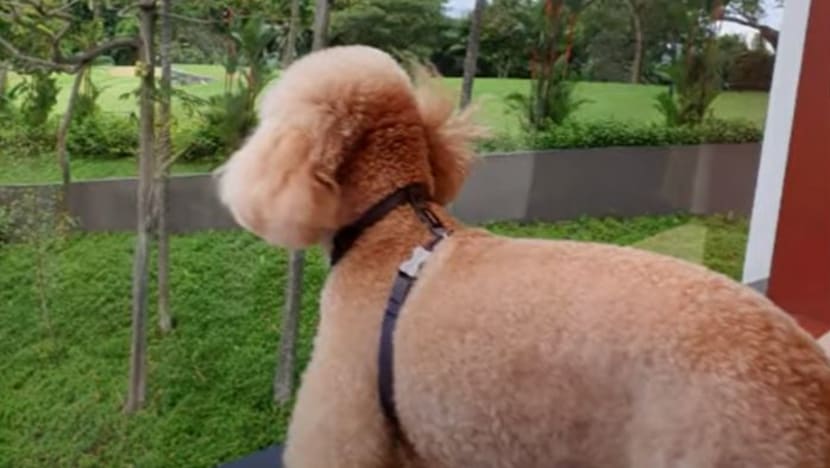Luxury 'spa-cation' for your dog? COVID-19 pandemic drives innovation, offerings for pets
As pet ownership rises around the world, Money Mind looks at what companies are doing to tap the market.

Odin the poodle recently went on a luxury staycation at a hotel in Singapore. (Image: Screengrab/Money Mind)
SINGAPORE: Call it a dog’s life.
Odin the poodle recently went on a luxury island staycation at one of the top hotels in Singapore.
The pet “spa-cation" came complete with a pampering Ayurvedic spa package, VIP treatment, and premium prices to match.
This very important pooch is the furkid of Sharon Sim, who counts Odin as a member of her family.
“Definitely the the mindset around the pet is that he’s part of the family," said Ms Sim.
“I have three kids. Two teenagers and a dog,” she added.
The poodle is just one of the growing number of pampered pets around the world.
According to one estimate, pet ownership around the world more than doubled in the first half of 2020 compared to 2019. But before the pandemic, pet care was already one of the fastest growing industries worldwide.
According to Future Market Insights, the sector is forecast to exhibit compound annual growth rate (CAGR) of 6 per cent between 2021 and 2031, in comparison with 4.2 per cent CAGR between 2016 and 2020.
“Humans are very happy and willing to spend a lot of money on their children. A pet can be a bit of a substitute in that regard," said Mr Richard Skinner, retail and consumer leader at PwC Singapore.
"I must admit my wife spends more on the dog’s hair cut than I’m allowed to spend on my own haircut. So we see it even in our own family,” he added.
Dog owner Ms Sim estimates that she spends about S$400 a month on her poodle’s daily necessities.
“Spending and taking care of his health is number one priority for us as pet owners, We want him to have a very balanced diet. And healthcare for the pet is also very important.”
DIGITAL INNOVATION FOR PET CARE
With pet owners spending more on both goods and services for their furkids, businesses are providing new options in the market.
Just as in the human world, digital innovation is a theme in the animal kingdom.
Singapore telehealth startup ZumVet offers online consultations for pets and their owners.
During the pandemic, the number of users in Singapore increased by eight times in a six-month period.
"As a pet, most of them just don’t like going out. And when they need to go to a vet, they know and they are very hesitant, so it’s a bit of a battle to have to go out. So what’s really lacking in the ecosystem right now is some sort of virtual touchpoint," said Ms Athena Lee, co-founder of ZumVet.
As the former CEO of a telemedicine start-up for humans, Ms Lee was familiar with health tech solutions, but it took some work to adjust the business model for animal clients.
“It’s a completely different type of offering. In terms of workflow, in terms of how we have to build solutions, there is a lot more education involved," said Ms Lee.
"We had to create that base line, create that foundation for pet owners to be able to find the right information they needed and to help them make quick decisions. And oftentimes that can mean life or death for a lot of pets,” she added.
According to the company’s market research, a significant portion of pet owners do not visit the vet regularly.
The company is hoping to cash in on this untapped market with its telemedicine alternative.
It estimates that the pet telemedicine market in Southeast Asia could be worth more than US$200 million.
“Pet telemedicine is only one part of a holistic healthcare solution. We see it developing into a clearer gateway for other parts of the pet industry - imagine customised pet diets based on real-time data, coupled with periodic reviews by a vet to calibrate your pet’s nutrition. We see this type of symbiosis of different pet care offerings catalysing the overall growth of the industry, especially pet healthcare,” said Ms Lee.
Market watchers say the growth of the pet industry in Asia will also be driven by demographic changes.
"This semi-links to an ageing population perspective. You see in some countries with a high aged population, a high pet ownership. So people treat them like their babies in a way. There’s a lot of money being spent on those pets, whether it is grooming, the trading and so forth," said PwC Singapore's Mr Skinner.
In the US alone, the pet industry was worth about US$118 billion in 2019, and is expected to more than double in the next 10 years, according to Morgan Stanley.
In Singapore, the pet food industry generated revenue of US$102 million in 2018, according to Craft Driven Research.
And the future drivers of growth are likely to feature themes that are already familiar in the human world, such as technology, the desire for a healthier lifestyle, and a growing emphasis on sustainability.
“First thing you start to spend is on pet food. And we’ve already started to see some pet food deals in Southeast Asia and wider. And then as it becomes more established, there might be more vet deals and more services, like financial services and insurance. So there will be an evolution of the types of deals in terms of what you can offer the pet,” said Mr Skinner.
Ms Jasmine Tan is general manager of Yappy Pets, a pet food business in Singapore.
“Many of the pet products are actually going towards the humanisation route - the pet owner wants the same for their pets and that’s why you have things like staycations. In terms of sustainability, we are also looking at possibilities like insect protein for pets.”


















